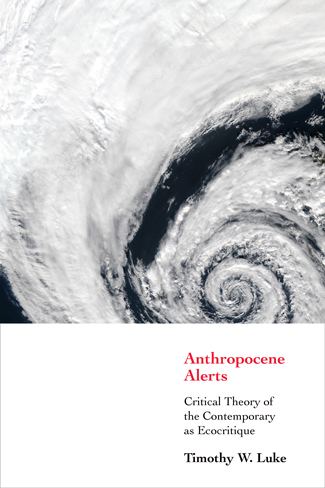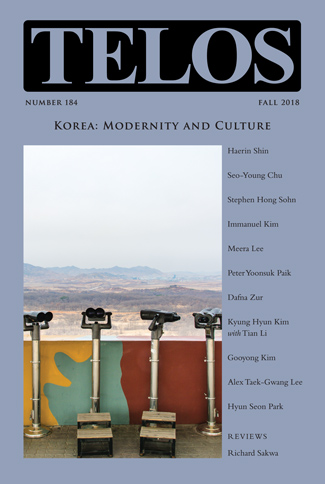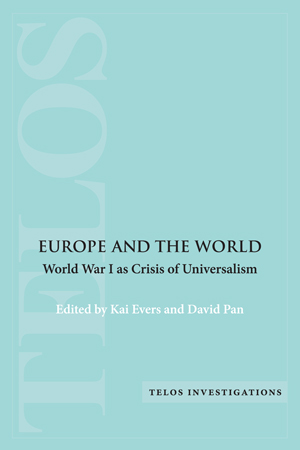By Russell A. Berman · Wednesday, November 11, 2020 The President of France, Emmanuel Macron, delivered this speech on September 4, 2020. I discussed it in a TelosScope post here, putting it in dialogue with President Trump’s Mount Rushmore speech of July 4. There has been interest on the part of some readers in a full translation of Macron’s text, so it is offered below.
The context: Macron is welcoming a group of newly naturalized citizens into the national community. Hence his double agenda: on the one hand, highlighting the diversity of France as an immigrant nation, while on the other insisting on the unity of French history, culture, language, and above all the Republic. This is a speech about the Republican values that Macron expects all French citizens to share and, what’s more, to uphold actively and vigorously. “Liberty, Equality, Fraternity” have a standing in French political culture similar to “life, liberty, and the pursuit of happiness” from the American Declaration of Independence.
Continue reading →
By Telos Press · Monday, December 9, 2019 New from Telos Press: Anthropocene Alerts: Critical Theory of the Contemporary as Ecocritique, by Timothy W. Luke. Order your copy in our online store, and save 20% on the list price by using the coupon code BOOKS20 during the checkout process.
 From the late 1970s, Timothy W. Luke has developed critical analyses of significant social, political, and cultural conflicts, with a particular focus on the entangled politics of culture, economy, and nature. Luke’s “ecocritiques,” many of which first appeared in the pages of Telos, advance a critical theory of the contemporary that takes aim at our ongoing ecological crisis, a period marked by rapid climate change, extensive biodiversity loss, and deep ecospheric damage. The essays collected here range across diverse topics, from the politics of the Anthropocene, Paolo Soleri’s urban design experiments, the Unabomber manifesto, the Trump administration’s attacks on environmental protections, and the informationalization of ecological change, to community agriculture projects, deep ecology, the symbolic politics of climate change treaties, Edward Abbey’s ecological writings, and the biopolitics of accelerationism and the Dark Enlightenment. Taken together, this collection documents crucial moments in Luke’s project of ecocritique as well as the commitment of Telos to environmental criticism, political theory, and policy analysis. From the late 1970s, Timothy W. Luke has developed critical analyses of significant social, political, and cultural conflicts, with a particular focus on the entangled politics of culture, economy, and nature. Luke’s “ecocritiques,” many of which first appeared in the pages of Telos, advance a critical theory of the contemporary that takes aim at our ongoing ecological crisis, a period marked by rapid climate change, extensive biodiversity loss, and deep ecospheric damage. The essays collected here range across diverse topics, from the politics of the Anthropocene, Paolo Soleri’s urban design experiments, the Unabomber manifesto, the Trump administration’s attacks on environmental protections, and the informationalization of ecological change, to community agriculture projects, deep ecology, the symbolic politics of climate change treaties, Edward Abbey’s ecological writings, and the biopolitics of accelerationism and the Dark Enlightenment. Taken together, this collection documents crucial moments in Luke’s project of ecocritique as well as the commitment of Telos to environmental criticism, political theory, and policy analysis.
Continue reading →
By Haerin Shin · Monday, September 24, 2018 Telos 184 (Fall 2018), a special issue on Korea, edited by Haerin Shin, is now available for purchase in our store.
 While Korea’s history as a modern nation-state has always been a tumultuous reel of socio-political unrest, never has it drawn the globe’s attention to the degree and extent to which the press coverage of the past two years attests. South Korea’s candlelight demonstrations in the fall of 2016 were widely regarded as a newly arisen form of celebratory civil protest culture, and news of the progressive party’s subsequent rise to power stood out amid the global turn toward conservative politics. Meanwhile, with North Korea’s nuclear threat becoming a palpable reality, media outlets began clamoring with predictions of a major military outbreak across the Pacific. (I remember being inundated by concerned emails from acquaintances abroad during my breaks in South Korea last year.) Then came the dramatic shift toward prospects of denuclearization and North–South collaboration this past summer. Millions watched in awe as Kim Jong Un took President Moon’s hand and walked over the Military Demarcation Line. The meeting in Singapore was viewed with skepticism in the United States, but more pertinently such attempts to reestablish channels of communication were greeted warmly in South Korea. While Korea’s history as a modern nation-state has always been a tumultuous reel of socio-political unrest, never has it drawn the globe’s attention to the degree and extent to which the press coverage of the past two years attests. South Korea’s candlelight demonstrations in the fall of 2016 were widely regarded as a newly arisen form of celebratory civil protest culture, and news of the progressive party’s subsequent rise to power stood out amid the global turn toward conservative politics. Meanwhile, with North Korea’s nuclear threat becoming a palpable reality, media outlets began clamoring with predictions of a major military outbreak across the Pacific. (I remember being inundated by concerned emails from acquaintances abroad during my breaks in South Korea last year.) Then came the dramatic shift toward prospects of denuclearization and North–South collaboration this past summer. Millions watched in awe as Kim Jong Un took President Moon’s hand and walked over the Military Demarcation Line. The meeting in Singapore was viewed with skepticism in the United States, but more pertinently such attempts to reestablish channels of communication were greeted warmly in South Korea.
Continue reading →
By Telos Press · Tuesday, May 1, 2018 New from Telos Press: Europe and the World: World War I as Crisis of Universalism, edited by Kai Evers and David Pan. Order your copy in our online store, and save 20% on the list price by using the coupon code BOOKS20 during the checkout process.
 With contributions by Étienne Balibar, Annette Becker, Russell Berman, Jörn Leonhard, among many others, Europe and the World: World War I as Crisis of Universalism focuses within Europe on the conflicts between nationalism and cosmopolitanism as a universalist political project and globally on the conflicts between European imperial politics and universal ideals. This collection of essays probes how these conflicts defined the war as the transition point to a new structure of global relations and postcolonial understandings of cultural identity. The volume’s first part considers the history of European universalism and how it affected the lead-up to the war. The second part analyzes how universalist goals affected the conduct of the war itself. While August 1914 marked a simultaneous turning point in Europe, Africa, and Asia, the war ended without such global synchronicity. Instead, it gave way to a wide variety of new spaces and chronologies of violence on a global level. Part three offers case studies of how representations of the war affected its remembrance and the way such war stories subverted or fit into different national narratives. The contributions in part four investigate different ways in which the experience of war and mass violence affected national cultures and notions of universalism in the United States and within Europe. With contributions by Étienne Balibar, Annette Becker, Russell Berman, Jörn Leonhard, among many others, Europe and the World: World War I as Crisis of Universalism focuses within Europe on the conflicts between nationalism and cosmopolitanism as a universalist political project and globally on the conflicts between European imperial politics and universal ideals. This collection of essays probes how these conflicts defined the war as the transition point to a new structure of global relations and postcolonial understandings of cultural identity. The volume’s first part considers the history of European universalism and how it affected the lead-up to the war. The second part analyzes how universalist goals affected the conduct of the war itself. While August 1914 marked a simultaneous turning point in Europe, Africa, and Asia, the war ended without such global synchronicity. Instead, it gave way to a wide variety of new spaces and chronologies of violence on a global level. Part three offers case studies of how representations of the war affected its remembrance and the way such war stories subverted or fit into different national narratives. The contributions in part four investigate different ways in which the experience of war and mass violence affected national cultures and notions of universalism in the United States and within Europe.
Continue reading →
By Yifeng Sun · Wednesday, November 1, 2017 Yifeng Sun’s “Cosmopolitan Translation and Cross-Cultural Paradigms: A Chinese Perspective” appears in Telos 180 (Fall 2017), a special issue on Cosmopolitanism and China. Read the full article at the Telos Online website, or purchase a print copy of the issue in our online store. Individual subscriptions to Telos are now available in both print and online formats.
This paper proposes to investigate the shifting cross-cultural paradigms in response to cosmopolitan thinking and consciousness as well as the nature of cultural translation in relation to cosmopolitanism. The perception of cosmopolitan translation, referring primarily to cultural translation situated fully within the cosmopolitan constellation, is closely linked to cognitive, social, and cultural change in a global and globalizing context. The rapid development of globalization raises questions about nationalism, cultural identity, and, above all, translation itself.
Continue reading →
By Ning Wang · Friday, October 13, 2017 Ning Wang’s “From Shanghai Modern to Shanghai Postmodern: A Cosmopolitan View of China’s Modernization” appears in Telos 180 (Fall 2017), a special issue on Cosmopolitanism and China. Read the full article at the Telos Online website, or purchase a print copy of the issue in our online store. Individual subscriptions to Telos are now available in both print and online formats.
To discuss the issue of cosmopolitanism in the Chinese context is, as in the Western context, no longer new to China’s humanities intellectuals, for this issue once did attract Chinese intellectuals in the 1920s when nationalism dominated Chinese academia and intellectual circles. Furthermore, it indeed had some parallel elements in ancient Chinese philosophy. It is therefore quite natural that cosmopolitanism was not so attractive when China, according to Dr. Sun Yat-sen, was not qualified enough to talk about cosmopolitanism as it was still poor and backward at the time. In the current era of globalization, along with the increasingly important role played by China and its leaders, more and more scholars have been paying considerable attention to this issue with regard to global culture and world literature.
Continue reading →
|
|





